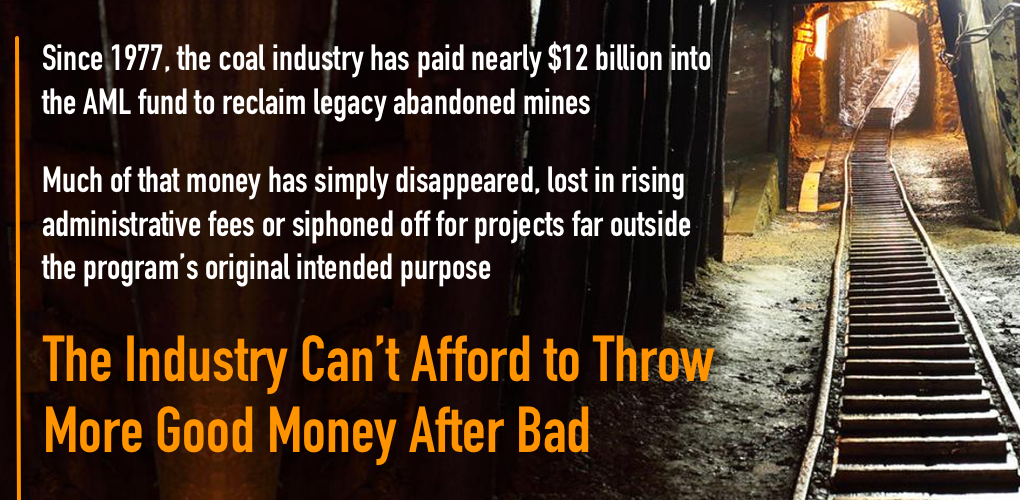
It’s Time to Reform and Refocus the AML Program
When Congress considers reauthorization of a program or a fee on an industry, it’s a moment for review and analysis. Is the program working as intended, does the structure and funding meet the moment or need to reflect changing facts on the ground? These are important questions that often come with enormous price tags that can also have huge implications for the competitiveness of industries and the jobs those industries support. That’s certainly the case with the latest debate over the future of the Abandoned Mine Land Reclamation Program (AML) and fee.
While there is industry and bipartisan support for continuing the program, views diverge on just how it should move forward. Some members of Congress would like to see the program go ahead just as it is, while others recognize need for reform to address the 40-plus years of mission creep that has increasingly diverted program funds to purposes other than those initially intended at the program’s inception. However well-intentioned, the program has become a slush fund for community programs, economic diversification and extraneous purposes better served by other existing federal programs. Coupled with the high administrative costs of the program, just one in three dollars spent by the fund has gone to priority coal projects that the fund was intended to rehabilitate.
Companion pieces of legislation in both chambers introduced by the Wyoming delegation, Senators Lummis and Barrasso and Representative Cheney, provide the right path forward. Their bills ensure the AML program focuses on the important work of cleaning up legacy mine sites, recognize the need for better oversight of the fund, and acknowledge how drastically the market has changed since the current fees were set.
The Industry Can’t Afford to Throw More Good Money After Bad
Since 1977, the coal industry has paid nearly $12 billion into the AML fund to reclaim legacy abandoned mines. Unfortunately, much of that money has simply disappeared, lost in rising administrative fees or siphoned off for projects far outside the program’s original intended purpose.
With the program and current fee structure up for reauthorization, and with recognition that the coal industry is facing significant headwinds, this would seem like an opportune moment to target program reform and fee adjustment. Yet, only the legislation from the Wyoming delegation aims to bring the program closer in alignment with its intended purpose and bring the needed oversight required to ensure funds are not squandered on ballooning administrative costs or purposes that have little to do with the important work of cleaning up priority mine sites. Decades of misappropriated spending have led to understandable frustration and an urgent need for oversight, focus and transparency about how the fund is used.
Speaking to her legislation, “The Abandoned Mine Land Reclamation Fee Reauthorization Act of 2021,” Congresswoman Liz Cheney said, “this bill will allow the AML program to continue while reducing the burden on coal miners, particularly in light of the significant hardships they have faced from the decline in demand for coal. We need to do what we can to ensure our coal industry can continue to provide good paying jobs and contribute to local and state economies.”
National Mining Association President and CEO, Rich Nolan, agreed, saying, “there’s no doubt that the AML program is in need of reform. The common sense actions outlined in this bill to encourage program transparency, accountability and effectiveness, while better reflecting the realities of the market… can help us chart a path forward to bipartisan partnership in achieving the program’s original purpose.”
There is bipartisan agreement that cleaning up these mine sites should be a priority. President Biden has made doing so an important piece of his Jobs Plan and members of both parties see mine reclamation as both a necessity and a “jobs opportunity.” But it can only be a “jobs opportunity” if we first recognize that reauthorizing the AML fee at its existing level, while failing to recognize the current state of the coal industry, could dismantle far more good mining jobs than reclamation can create. Ensuring AML funding for the future means ensuring the coal industry is provided the opportunity to keep producing. A reformed and refocused approach to AML is the right approach. It’s the approach offered by the Wyoming delegation.
- On June 2, 2021
